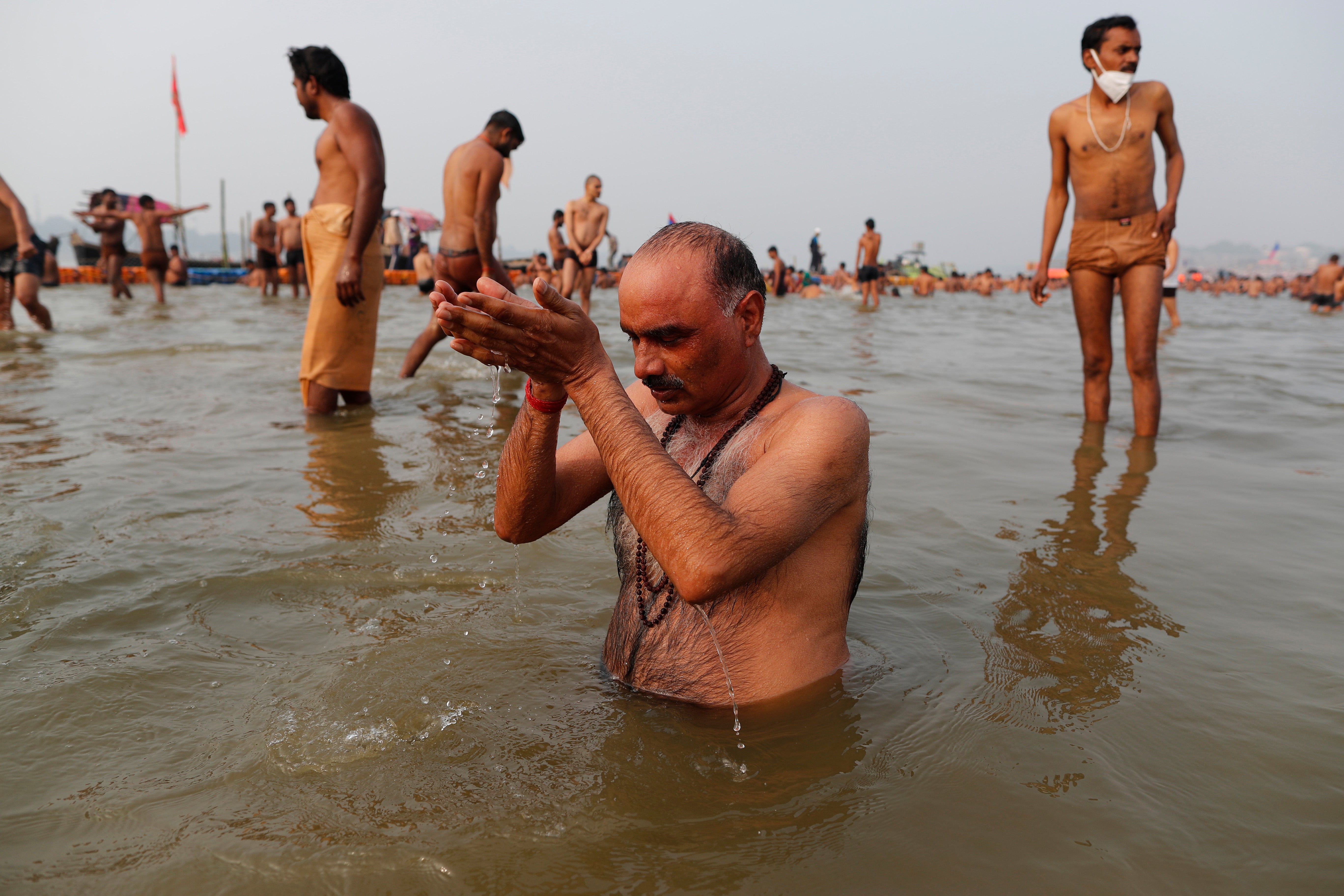Makar Sankranti 2022: Thousands gather at Hindu festival in India as Covid virus surges
Tens of thousands of devout Hindus are taking a holy dip into the frigid waters of the Ganges River in northern India despite rising COVID-19 infections in the country

Your support helps us to tell the story
From reproductive rights to climate change to Big Tech, The Independent is on the ground when the story is developing. Whether it's investigating the financials of Elon Musk's pro-Trump PAC or producing our latest documentary, 'The A Word', which shines a light on the American women fighting for reproductive rights, we know how important it is to parse out the facts from the messaging.
At such a critical moment in US history, we need reporters on the ground. Your donation allows us to keep sending journalists to speak to both sides of the story.
The Independent is trusted by Americans across the entire political spectrum. And unlike many other quality news outlets, we choose not to lock Americans out of our reporting and analysis with paywalls. We believe quality journalism should be available to everyone, paid for by those who can afford it.
Your support makes all the difference.Tens of thousands of devout Hindus led by heads of monasteries and ash-smeared ascetics, took a holy dip into the frigid waters of the Ganges River in northern India on Friday despite rising Covid-19 infections in the country.
Hindu pilgrims congregated at the Sangam, the confluence of three rivers — the Ganges, the Yamuna and the mythical Saraswati — in Prayagraj city, 200 km (124 miles) northeast of Lucknow the state capital of Uttar Pradesh to participate in the Magh Mela festival, one of the most sacred pilgrimages in Hinduism. They bathed in the Ganges waters, a ritual Hindus believe will wash away their sins and free them from the cycle of death and rebirth.
A similar gathering at a Hindu festival last year in the Himalayan town of Haridwar, in neighboring Uttarakhand state, helped spread the delta variant that ravaged the country and made India one of the world’s worst-hit countries. Epidemiologists described the festival as a “superspreader event.”
Coronavirus infections, fueled by the omicron variant, are rising fast throughout India. The country reported over 264,000 new infections on Friday but hospitalizations remain relatively low.
Millions of Hindus are expected to throng the festival for the next 47 days. Many of them will stay on the banks of the Ganges for a month leading the life of an ascetic, with the belief they will receive salvation. It has raised concerns that pilgrims could get infected and take the virus back to their cities and villages in other parts of the country.
Already, 77 policemen and 12 cleaning staff deployed for the event have tested positive for the virus.
“This is going to be a super spreader. The government should not allow a congregation of people in such a large number because religious congregations in the past two years were found responsible for spreading the deadly virus all across the country,” said Utkarsh Mishra, a lawyer who has filed a petition in the Allahabad High Court asking that the festival be canceled.
Mishra said only locals and heads of important Hindu monasteries should be allowed to take part in the ritual.
Fearing a rise in infections, authorities in neighboring Uttarakhand state have already banned a similar gathering.
Health experts earlier appealed for the festival to be canceled in Uttar Pradesh state too, but the government went ahead saying safety rules would be followed.
Shesh Mani Pandey, a senior official in charge of the event, said only those who have taken two doses of the Covid-19 vaccines and have vaccination certificates would be allowed to join the ritualistic bathing. He said pilgrims will be allowed to enter the festival site after going through thermal scanning at the entry gates.
Critics of Prime Minister Narendra Modi and his Hindu-nationalist Bharatiya Janata Party say the festival has been allowed despite rising infections because the government isn’t willing to anger Hindus — they are the party’s biggest supporters — ahead of crucial state elections in Uttar Pradesh.
The BJP-ruled state is holding polls on February 10.